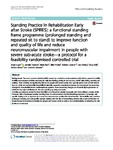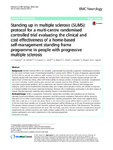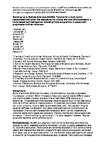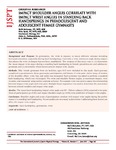Standing Practice In Rehabilitation Early after Stroke (SPIRES): a functional standing frame programme (prolonged standing and repeated sit to stand) to improve function and quality of life and reduce neuromuscular impairment in people with severe sub-acute stroke-a protocol for a feasibility randomised controlled trial.

Date
2018-12Author
Subject
Metadata
Show full item recordAbstract
Background: The most common physical deficit caused by a stroke is muscle weakness which limits a person's mobility. Mobility encompasses activities necessary for daily functioning: getting in and out bed, on/off toilet, sitting, standing and walking. These activities are significantly affected in people with severe stroke who typically spend most of their time in bed or a chair and are immobile. Immobility is primarily caused by neurological damage but exacerbated by secondary changes in musculoskeletal and cardiorespiratory systems. These secondary changes can theoretically be prevented or minimised by early mobilisation, in this case standing up early post-stroke.Standing up early post-stroke has been identified as an important priority for people who have suffered a severe stroke. However, trials of prolonged passive standing have not demonstrated any functional improvements. Conversely, task-specific training such as repeated sit-to-stand has demonstrated positive functional benefits. This feasibility trial combines prolonged standing and task-specific strength training with the aim of determining whether this novel combination of physiotherapy interventions is feasible for people with severe stroke as well as the overall feasibility of delivering the trial. Methods/design: This is a pragmatic multi-centre parallel single-blinded two-armed feasibility randomised controlled trial. Fifty people with a diagnosis of severe stroke will be randomly allocated to either the functional standing frame programme or usual physiotherapy. All patient participants will be assessed at baseline and followed up at 3 weeks, then 3, 6 and 12 months post-randomisation. Trial objectives are to determine the feasibility according to the following indicators:: (i) Process: recruitment and retention rate, ability to consent, eligibility criteria, willingness/ability of physiotherapists to recruit, willingness of patients to be randomised, and acceptability of the intervention; (ii) Resource: burden and potential costs; (iii) Management: treatment fidelity, participant adherence, acceptability and completeness of outcome measures, impact and management or orthostatic hypotension; and (iv) Safety: number and nature of adverse and serious adverse events. Discussion: The functional standing frame programme addresses a key concern for people who have suffered a severe stroke. However, several uncertainties exist which need to be understood prior to progressing to a full-scale trial, including acceptability and tolerance of the functional standing frame programme intervention and practicality of the trial procedures. This feasibility trial will provide important insights to resolve these uncertainties. Trial registration: International Standard Randomised Controlled Trial Number ISRCTN15412695. Registration on 19 December 2016.
Publisher
Place of Publication
Journal
Volume
Issue
Pagination
Author URL
Number
Recommended, similar items
The following license files are associated with this item:
Related items
Showing items related by title, author, creator and subject.
-
Standing up in multiple sclerosis (SUMS): protocol for a multi-centre randomised controlled trial evaluating the clinical and cost effectiveness of a home-based self-management standing frame programme in people with progressive multiple sclerosis.
Freeman, Jennifer; Hendrie, W; Creanor, Siobhan; Jarrett, L; barton, andy; Green, C; Marsden, Jonathan; Rogers, E; Zajicek, J (Springer Science and Business Media LLCEngland, 2016-05-05)Multiple sclerosis (MS) is an incurable, unpredictable but typically progressive neurological condition. It is the most common cause of neurological disability in young adults. Within 15 years of diagnosis, approximately ... -
Standing up in Multiple Sclerosis (SUMS): Protocol for a multi-centre randomised controlled trial evaluating the clinical and cost effectiveness of a home-based self-management standing frame programme in people with progressive multiple sclerosis.
Freeman, Jennifer; Hendrie, W; Creanor, Siobhan; Jarrett, L; barton, andy; Hawton, A; Morby, D; Hooley, S; Marsden, J; Zajicek, J (2017-05-01) -
IMPACT SHOULDER ANGLES CORRELATE WITH IMPACT WRIST ANGLES IN STANDING BACK HANDSPRINGS IN PREADOLESCENT AND ADOLESCENT FEMALE GYMNASTS.
McLaren, K; Byrd, E; Herzog, M; Polikandriotis, JA; Willimon, SC (2015-06)BACKGROUND AND PURPOSE: In gymnastics, the wrist is exposed to many different stresses including increased extension, especially during back handsprings. Currently a wrist extension angle during impact that places the ...




